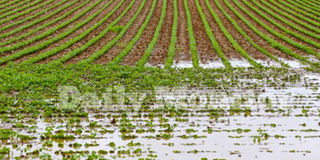Book on climate resilience agriculture launched

Changing weather patterns remain an obstacle to farming practices in this era. PHOTO/FILE.
Smallholder farmers in Africa whose livelihoods depend on rain fed agricultural production need to be resilient to sustain their wellbeing in a context of highly variable rainfall patterns.
This therefore means they have to adopt practices that can sustain their agricultural activities during prolonged dry seasons and at times of too much rain leading to extensive flooding.
This is the thinking of agricultural scientists from Uganda, Ethiopia, South Sudan and Norway who have been implementing a five-year project about the topic “Agriculture and Ecosystem Resilience in Sub Saharan Africa; livelihoods pathways under changing climate”.
Project implementation
Prof Samuel Kyamanywa from Makerere University while launching the book, noted that most of the universities in East Africa have been repositioning themselves to ensure that they are responding innovatively to the national challenges and needs faced by farmers.
On recognition of this fact, universities such as Addis Ababa University, Makerere University and Norwegian University of Life Sciences developed a project entitled “Regional Capacity Building for Sustainable Natural Resource Management and Agricultural Productivity under Changing Climate (CAPSNAC).
The project was focused in addressing issues of experts getting involved in developing resilient agricultural systems meaning the universities must have appropriate and strong capacities in natural resource management and sustainable agriculture.




